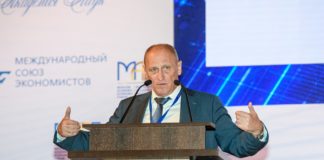Dear readers!
This issue is centered on Karl Marx, who will be 200 years old on May 5 this year (or has already turned 200 if this issue came to you after that date). A formidable age, on the one hand, and on the other, history has proven that Marx is still “the liveliest of all people”. The number of citations of Marx’s works is comparable to that of the Bible and amounts to billions, and the supporters and opponents of his teaching are still divided into two huge camps and react emotionally to each other.
In part, it is due to the fact that in this country the man has become inseparably linked with the communist idea, with the revolution. But Karl Marx was not a revolutionary, he was a scholar, so we’ll be looking at his legacy from the point of view of economic theory and history.
The name of Marx connects the key topics of this issue: from the congress of the Free Economic Society of Russia, where the scholarly legacy of that thinker was mentioned multiple times, to the St. Petersburg Economic Congress, to the important events in China, where, obviously, Marx’s anniversary is celebrated with particular delight considering the successes achieved by the country under the direct influence of Marxist ideas.
It is especially important that the concept of noonomy developed and presented at the Congress by yours truly echoes the teachings of Marx, who predicted that with the development of the productive forces man, by “transcending the limits of material production”, will engage in what he was actually created for in the first place—creativity.
Noonomy, a system of economic management in which relations among people not connected with material production will be of paramount importance, will form a basis, a foundation of the future society which, however, may become a reality with the rational development of human civilization. Information/communication (nowadays widely known as digital) and cognitive technologies which, unlike all others, demonstrate their high capacity to penetrate technological processes of any kind, will allow them to become an integrated technological platform capable of combining diverse
technologies into hybrid technological processes. In fact, information and cognitive technologies will serve as a channel for embedding knowledge in technological processes—via big data processing and artificial intelligence.
In this case, the radical change is the transition to knowledge- intensive material production, which has caused a chain of changes in all spheres of industrial production. These changes include a drastic reduction in the role of material factors of production, an increase in the role of knowledge, acceleration of scientific and technological progress, and many other things.
The growing role of knowledge does not mean that purely intellectual activity will displace or replace material production, as post-industrialists believed. Rather, it means that material production will itself become much more knowledge-intensive. As a result, there will come a time when the knowledge-related portion of many mass products will, so to say, begin to substantially outweigh the material portion.
Our civilization stands on the verge of a qualitative leap: man will be gradually leaving material production behind by transcending “the limits of material production” and assuming the role of its “supervisor and regulator”, as Karl Marx predicted. Knowledge, not material resources, will be the main source of production development. The current simulative needs will gradually retreat to the background, replaced by the need for knowledge. The system of property inequality will be replaced by a system of inequality of abilities and talents; humanity, having become the most powerful geobiological force according to Vernadsky, will face the need to switch from consumption of natural resources to reproduction of geobiocenoses.
Traditional categories and laws of economics—value, property, money—will gradually lose their meaning in this future which is already upon us, if not disappear altogether. The future evolution of all economic forms into non-economic ones and, I would say, the dissolution of economy seems logical. And it is not a prediction of a very distant future. This is an affirmation of change, as yet barely noticeable but already ongoing, not simply a birth of an economy adapted to solving the problems inherent in the progress of the noosphere, but a qualitatively new phenomenon — the noonomy. By noonomy we mean a non-economic way of organizing an economy according to one’s needs by man who transcended the limits of material production. In other words, noonomy is an economic system that differs from economy by the absence of relationships among people in the course of material production. This is a fundamental difference of the future economic system from the economic system we are accustomed to.
Mankind is at a crossroads: it can either move towards rationalization of development, towards noonomy, or let the invariably negative scenario play out, which may even end in a global catastrophe, since many negative trends have accumulated in the development of the technosphere. The biological aspect of the human environment is being threatened, and at the same time problems of human interaction with the technosphere have been accumulating. Man is no longer guaranteed future survival as a biological and social species.
Only those economies that are able to address the challenges of noonomy (which is already visible on the horizon) will occupy positions of leadership in the world of the near future.
Our development should not be guided by GDP growth because GDP is merely a reflection, and not even the best one, of the volume of goods and services, including simulative ones, produced by mankind. A set of criteria for assessing the level of satisfaction of man’s specific rational and reasonable needs necessary to ensure his development should come to the fore. And the opportunity to raise the level of meeting the needs without piling up a mountain of extra stuff that is unnecessary, given a reasonable approach, and that will devour our planet and kill the natural environment has just opened up to us via intelligent use of modern technologies.
Russia is living through a difficult period. Many people do not believe we will be able to go down a difficult road of restoring our global position, attaining high living standards, taking steps towards decent development. But Russia has a chance of breaking through to such a future. It is connected with both its past achievements and the country’s remaining potential in those areas that are particularly
important for moving towards the new type of industrial society (NIS.2) and beyond that, to noonomy: our cultural, educational and scientific potential. If, instead of just saving it, we are able to multiply it by creating appropriate economic and political conditions, our country will have a chance to defeat stagnation and overcome the lagging behind not only Western countries but also countries of the East.
It is this potential of Russia and its people that drives the development of the society which is necessary for the transition to a new economy and noonomy.
Sergey Bodrunov
Editor-in-chief
The Free Economy Journal






